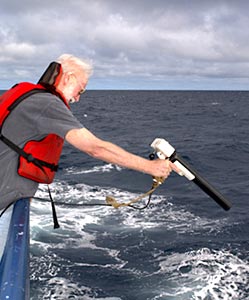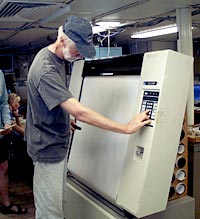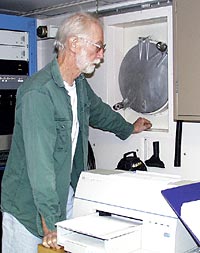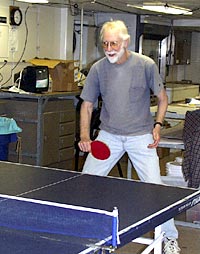|
|
Shipboard Computer Technician Dan Jacobson
When did you start working for SCRIPPS and where have you gone?
I was working for a software company in Bloomington, Indiana four years ago and wanted to go someplace warmer. I found an announcement for this job and the words “Duty aboard seagoing research vessel” popped out at me and I thought, ‘Wow!’ that’s what I want to do. Primarily I work as the systems and network administrator. I’ve traveled now on Scripps ships to New Zealand, Korea, Fiji, Samoa, New Caledonia, Mexico, Ecuador, Costa Rica and now the Galapagos and soon Peru. When the ship was in Guam, I went to Bali for vacation. I’ll be in New Zealand again in January. The travel is grand, no question about it. The highlights would be Korea and Bali. Both places call into question my own way of living. Bali is especially nice, because it makes you feel stupid. There is so much you don’t know about how they live their lives and their relationship to each other, to religion and to civil authorities. For example, I can visit a temple there, but I can’t recreate the experience that they have when they visit a temple. In Bali they had one high-rise tourist hotel and I’m told everyone was so incensed by the look of it, that they passed a law that no buildings would be higher than a palm tree. It’s a gorgeous, grand place to visit because of its preserved look. In Korea it’s largely mountains and flatlands. Both are preserved and yet they have an enormous population. They build huge high rises in their cities, complexes on the foothills of the mountains or the edge of the cities, but only shrines and temples on the mountains. The flatlands are used for agriculture. It’s astonishing that they can preserve so much of the natural beauty with such an increasing urban population and that they continue to make those decisions is remarkable.
Where did you grow up and what inspired you to begin traveling? Dan: I grew up in the small town of Graettinger, Iowa, where the population was fewer than 1,000 people. My father was the local vet. I read Robert Louis Stevenson and Ernest Hemmingway growing up and began entertaining the idea of traveling at an early age. My sister, Madge, left home first and returned with many stories. So you could say it’s her fault. I studied engineering at Iowa State College, but drove site-seeing busses in the national parks of Colorado as a summer job. I would see the tours come through and I thought they might provide an opportunity to travel more so I got a job with one. Once I graduated with my engineering degree from Iowa State College, I started traveling and I never stopped. I worked for a number of tour guides around the continental United States and Hawaii, Canada and the Caribbean. I also spent some time in Asia, Europe and the Middle East. Question: What did you learn about yourself from these experiences? Dan: I learned to understand the difference between what is my responsibility and what is not. Now I only worry about the things in my control and I won’t worry about the things I can’t control. For example some of the tourists would say, “If it rains tomorrow what will we do?” And I would say, “Well, you can't worry about the rain.” I also learned that things usually work out pretty well. People in general are pretty nice; it’s not true that there is always a bad one in every barrel as they say. Often I found that what begins as a misfortune can turn into a blessing. When the bus broke down in Jordan, it took five hours for the tour company to bring us another bus. In the meantime, everyone wandered about the desert examining rocks and flowers. It was quiet lovely and ended up being the highlight of the trip.
What are your responsibilities on board Revelle? Dan: I’m primarily involved with systems administration, data collection, storage and programming. We have two communication systems I’m in charge of monitoring. Both systems rely on the InMarSat satellite network. We communicate with the closest one of four satellites that are in geosynchronous orbit around the equator - meaning the satellites orbit at the same speed of Earth’s rotation as though they were tethered above the equator. We have the Revelle communications systems and the SeaNet system. The Revelle system is the equivalent of a phone call. SeaNet, developed by WHOI and the Lamont-Doherty Earth Observatory, provides the UNOLS fleet with a high-speed data communications system. SeaNet is set up like an Internet connection between the station here and the shore. It can be pretty hectic at times, but with each new cruise we have a new community and the opportunity to build new friendships. We are all interdependent on each other and working toward a common goal. It’s pleasant and fulfilling and the travel experiences are wonderful. |
||||||||||
Mailing List | Feedback | Glossary | For Teachers | About Us | Contact
© 2010 Dive and Discover™. Dive and Discover™ is a registered trademark of
Woods
Hole Oceanographic Institution

 Dan deploying an XBT (expendable bathythermograph).
Dan deploying an XBT (expendable bathythermograph).

